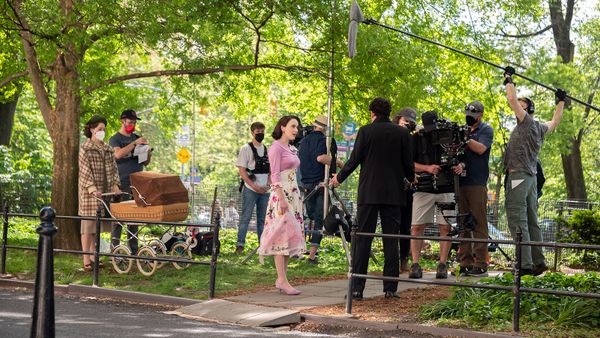
Most of us assume that between "starving actor" and "celebrity," there has to be a sweet spot where thespians can find modest work and still make a respectable income. But what happens when a show is canceled? Can an actor who played a small part on a modestly successful show move to the Caribbean and live off the television royalties forever?
Maybe. Most television actors don't live like royalty off their royalties — but some make a decent living. Royalties are referred to as "residuals" in the television world. A residual is a payment an actor is due when a show plays in reruns or is sold to syndication, released on DVD or streamed online. Calculating residuals is a tricky business, one that the TV industry leaves to its trade union, Screen Actors Guild-American Federation of Television and Radio Artists (SAG-AFTRA). Much like BMI or American Society of Composers, Authors and Publishers in the music world, SAG-AFTRA collects and pays out any residuals that are due to members.
Advertisement
SAG-AFTRA calculates residuals based on formulas that consider an actor's contract, time spent on the production, the production type and the market where the show appears. The amount paid out decreases after each rerun — so by the 13th rerun, the amount has decreased to 5 percent of the original fee the actor was paid for her appearance in an episode. This 5 percent will be paid every time an episode is run forever. In general, only "principal performers" receive residuals [source: Andres]. Background actors or "extras" (random storm troopers on "The Mandalorian," for instance) do not usually receive residuals.
According to one rough calculation, if each of the stars of the hit '90s sitcom "Friends" received residuals at the normal SAG-AFTRA rates, they would get around $10,000 in residuals for each episode of the show in syndication [source: Andres]. With 236 episodes in reruns, that would add up to a handsome residual check of $2,360,000 per actor. In actuality, the "Friends" cast negotiated even higher residuals, with one estimate earning them closer to $20 million a year in syndication [source: Farrow].
Getting a big residual depends a lot on what the stars of the show negotiated during their time on the series. In 2016, Dawn Wells, star of '60s hit and perennial rerun "Gilligan's Island" said that a "misconception is that we must be wealthy, rolling in the dough, because we got residuals. We didn't really get a dime. Sherwood Schwartz, our producer, reportedly made $90 million on the reruns alone" [source: Farrow].
Actors who play bit roles, or even leading actors whose shows are less successful, also receive residual income, but the amounts are often small — sometimes laughably so. The mega-rich rapper Drake started off as a teen actor with a starring role on "Degrassi: The Next Generation" from 2001 to 2007. In 2016, he posted a pic on Instagram of a check for $8.25 (Canadian dollars or U.S. $6.58) that he claimed was a residual check from the show [source: Chin]. "Degrassi money still coming in don't sleep..." posted Drake sarcastically.
Actor Jeff Cohen, who appeared in one episode of the 1980s sitcom "The Facts of Life," wrote an article for Backstage magazine describing how he spent a $0.67 residual check. He took it to Maeve's Re$iduals, a pub that once traded a free drink for any SAG-AFTRA check of $1 or less. Maybe actors who can't live off their royalties can at least drink off their royalties forever?
Advertisement


